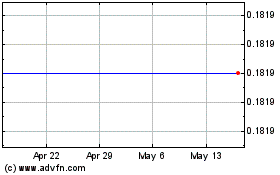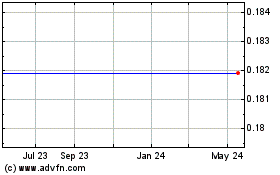By Andrew Scurria, Suzanne Kapner and Alexander Gladstone
J.C. Penney Co., battered by missteps and the rise of
e-commerce, is on the verge of being done in by the
coronavirus.
With nonessential shopping largely shut down across the U.S.,
the department-store chain is in advanced talks with bank lenders
for a bankruptcy loan as large as $1 billion to carry it through a
potential chapter 11 process, The Wall Street Journal reported
Thursday.
The store shutdowns have choked off revenue, putting more
pressure on the company's lopsided balance sheet. After years of
falling sales, red ink and failed turnaround efforts, the
coronavirus pandemic is hastening a reckoning with creditors over
Penney's $3.7 billion in debt.
The company has said in private negotiations it wants to
reorganize as a viable business and has proposed handing control to
lenders, according to people familiar with the matter.
But saving a retail chain with a business model in decline is
difficult, even under normal economic conditions. Retailers have
difficulty shrinking themselves back to health, according to
analysts, and are more likely than other types of companies to
simply liquidate through bankruptcy instead of getting back to
business.
"The answer doesn't lie in massive store closings," said Steve
Dennis, president of SageBerry Consulting. "If your fundamental
issue is you aren't relevant with customers, having fewer stores
doesn't solve that problem."
Along with Sears Holdings Corp., Penney for decades was a
one-stop shop for millions of middle-class American families.
Filing for chapter 11 puts the company at risk of shutting down
permanently, given the experience of other brick-and-mortar
retailers. While U.S. bankruptcy laws are designed to save indebted
companies, nearly half of the more than 50 retailers and
supermarkets that have filed for chapter 11 over the past 15 years
closed all their stores and went out of business for good,
according to Fitch Ratings research.
They include Toys "R" Us Inc. and Barneys New York Inc., which
both filed for chapter 11 hoping to reorganize but wound up in
liquidation. A Penney spokeswoman said liquidation isn't being
considered but couldn't comment on what a potential deal might look
like.
Retailers filing for bankruptcy during the pandemic will face
even more challenges. Chains typically use the bankruptcy process
to close laggard stores. The merchandise in those stores is then
sold in going-out-of-business sales, which helps provide cash to
fund creditors and continuing operations.
With stores closed, retailers can't run those sales. As the
inventory ages, it loses value.
"Cash from those sales is important for paying down debt and
funding operations going forward," said Michael Kollender, head of
consumer and retail investment banking at Stifel Financial
Corp.
Penney chose not to make an interest payment due April 15 as a
result of store closures caused by the pandemic and to take
advantage of a 30-day grace period to continue talks with
creditors, the spokeswoman said.
The company could theoretically cover the missed payment to
avoid the need for a chapter 11 filing when the 30-day grace period
runs out. Often companies that skip debt payments don't make them
up and instead enter bankruptcy.
A chapter 11 filing, which could come in the next several weeks,
would leave bankruptcy lenders firmly in control of the company's
fate, people familiar with the matter said. For retailers, the
loans they borrow to stay afloat during chapter 11 typically come
with requirements that pressure management to quickly decide which
stores, if any, will be kept open.
Bankruptcy loans also include financial covenants that, if
tripped, can trigger a default and put the company on a quick path
to liquidation. In the bankruptcies of Toys "R" Us and Barneys,
lenders kept the companies on a tight leash that put a successful
reorganization out of reach.
Companies can be reluctant to file for bankruptcy if they still
have significant worth to stockholders. But Penney has little
equity value left. Its shares, which trade well below $1, are at
risk of being delisted from the New York Stock Exchange.
Penney's failure to pay in mid-April surprised some investors,
given that it paid rent on April 1 when other large retailers such
as Staples Inc. and Ross Stores Inc. skipped their payments to
landlords and other companies are seeking long-term rent
relief.
Of Penney's creditors, top lenders have the most to gain in a
bankruptcy, which would stop the company from spending cash by
trying to turn around the business, or from making payments to
unsecured bondholders and other lower-ranking creditors.
In addition to the banks arranging bankruptcy financing, top
lenders include Sixth Street Partners and the credit-investing arms
of KKR & Co. and Apollo Global Management Inc., as well as H/2
Capital Partners LLC, people familiar with the matter said.
These lenders would get first crack at the proceeds from closing
down stores and selling inventory and real estate once stay-at-home
mandates are loosened. Penney is continuing to evaluate all
options, the spokeswoman said.
Some creditors have argued that Penney has enough cash and
borrowing capacity to stay alive without resorting to chapter 11
until its stores can reopen, people familiar with the matter said.
It owns about 230 stores that aren't encumbered by debt, according
to Citigroup Inc. analyst Paul Lejuez.
Since missing the interest payment, Penney has turned down a
$300 million financing proposal designed to avert a bankruptcy,
saying the offer didn't help fix the company's debt problem and
didn't provide enough liquidity, a person familiar with the matter
said.
Department stores were struggling before the health pandemic.
Sears filed for bankruptcy in 2018 and has continued to close
stores and sell assets. Macy's Inc. plans to close 125 locations
over the next three years. Kohl's Corp.'s sales fell for the most
recent fiscal year, which ended Feb. 1. Neiman Marcus Group Inc.
plans to file for bankruptcy in coming days after missing a debt
payment, a person familiar with the matter said.
Penney's problems date back nearly a decade. It never regained
its footing after a failed makeover by former Apple Inc. executive
Ron Johnson did away with discounts and popular in-house brands.
Former Home Depot Inc. executive Marvin Ellison, who is now CEO of
Lowe's Cos., brought back appliances when he took the reins at
Penney and lost focus on apparel, the chain's core business.
Jill Soltau, who has been CEO since 2018, has refocused on
apparel but her plan to remake stores is running out of time as the
pandemic cripples nonessential retailers.
"They lost their core customer and they have never been able to
get her back," said Chuck Grom, an analyst with Gordon Haskett
Research Advisors.
Write to Andrew Scurria at Andrew.Scurria@wsj.com, Suzanne
Kapner at Suzanne.Kapner@wsj.com and Alexander Gladstone at
alexander.gladstone@wsj.com
(END) Dow Jones Newswires
April 26, 2020 07:14 ET (11:14 GMT)
Copyright (c) 2020 Dow Jones & Company, Inc.
J C Penney (NYSE:JCP)
Historical Stock Chart
From Nov 2024 to Dec 2024

J C Penney (NYSE:JCP)
Historical Stock Chart
From Dec 2023 to Dec 2024
